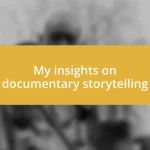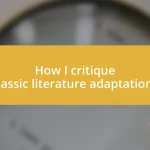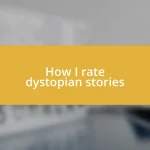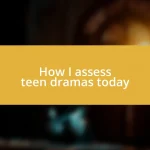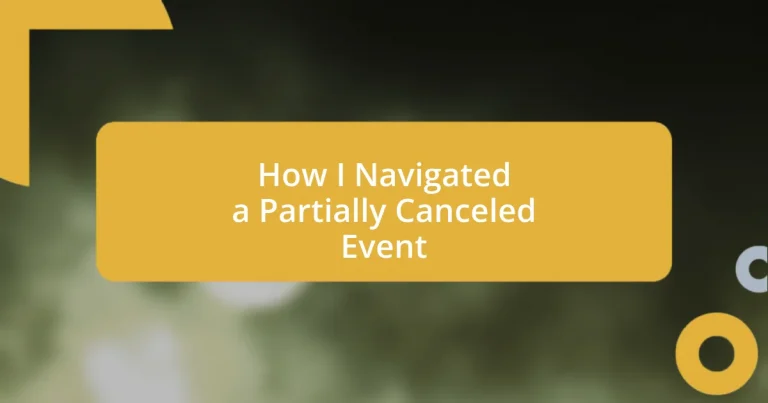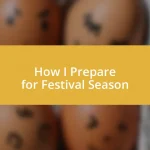Key takeaways:
- Understanding the emotional and logistical impacts of event cancellations highlights the interconnectedness of attendees, organizers, and stakeholders.
- Effective communication during cancellations, including empathy and transparency, significantly enhances attendee experience and fosters community.
- Flexibility in planning, gathering feedback, and building a supportive team are crucial for adapting to unexpected changes and improving future events.
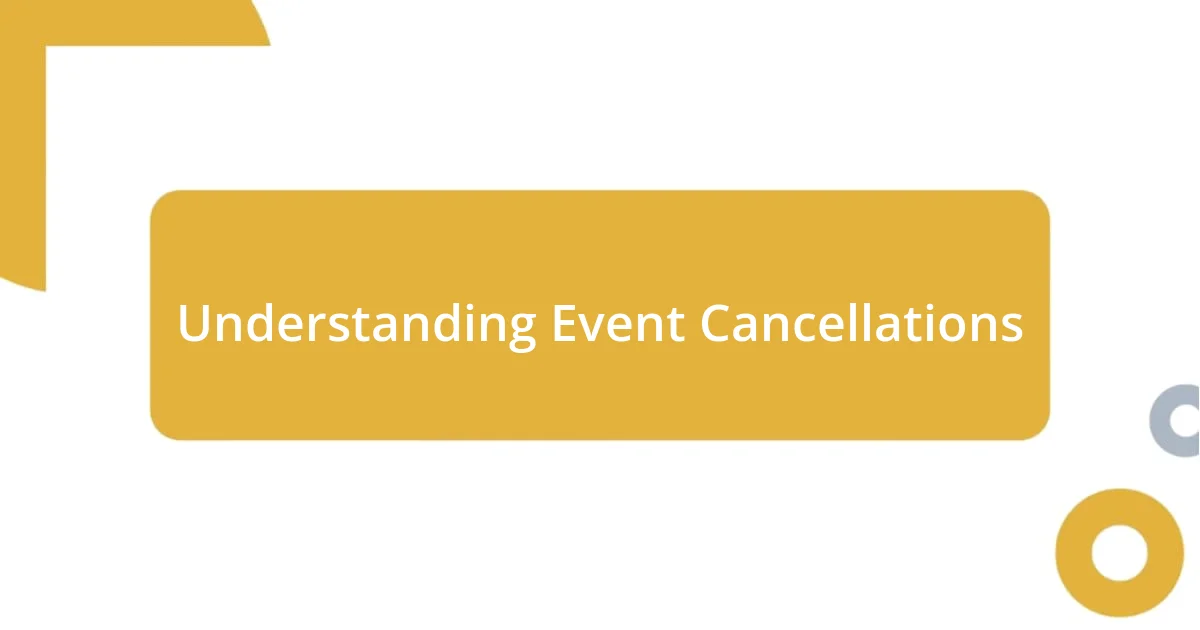
Understanding Event Cancellations
Understanding event cancellations can feel like trying to navigate a maze with a blindfold on. When I experienced my first significant cancellation, I remember the sinking feeling in my stomach. It’s not just the event itself that’s lost; it’s the anticipation, the connections you hoped to make, and the time you invested in planning everything. Have you ever planned something and felt that wave of disappointment when it suddenly fizzled out?
Cancellations can occur due to numerous factors, whether it’s a global crisis, venue issues, or unforeseen circumstances. I recall attending a festival that was abruptly cut short due to a storm—and it left me wondering about the efforts that go into organizing such events. It’s a lesson in understanding how external forces can impact plans we hold dear, often leaving organizers and attendees grappling with the consequences.
Moreover, there’s often emotional fallout to consider. I once faced a cancellation that affected my community heavily; people had made arrangements, bought tickets, and carved out time to join in. Reflecting on that, I realized how interconnected we are—sometimes, a canceled event can resonate far beyond its immediate impact, leaving a lingering sense of loss and prompting us to rethink how we handle such situations in the future. Isn’t it interesting how an event, regardless of its scale, can ripple through our lives, affecting not just logistics but also emotions?
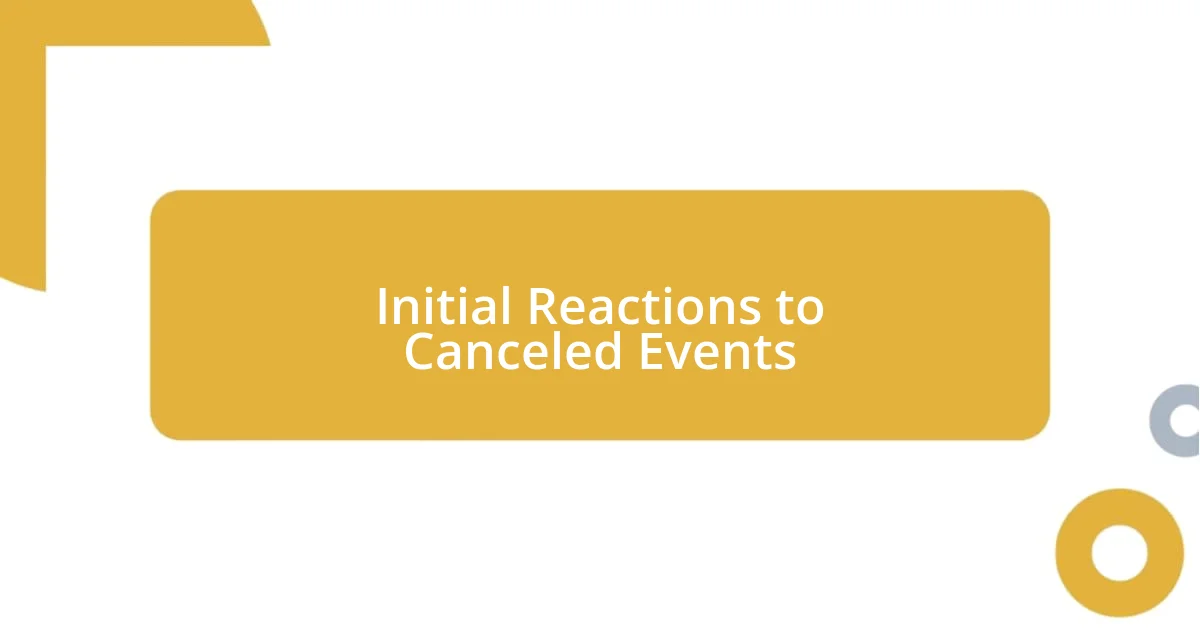
Initial Reactions to Canceled Events
When I first heard about the cancellation of an eagerly awaited concert, I felt an immediate wave of frustration. I had been counting down the days, daydreaming about the atmosphere, the music, and the enjoyment. It was as if someone had pulled a rug out from under me. Have you ever felt that kind of disappointment when your plans crumble unexpectedly?
Reflecting on those initial reactions, I noticed a pattern in how people process these emotions. I remember a friend who reacted with disbelief, scrolling through social media to confirm the news, half hoping it was a mistake. Meanwhile, another friend was outwardly calm, discussing potential new plans, showcasing a resilience I admired. This blend of denial and proactive coping strategies illustrates how each of us engages differently with these moments—adapting our feelings and responses accordingly.
As time passed, I found myself reflecting on how disappointment can give way to introspection. I began to understand that while my initial response was rooted in frustration, there was an opportunity to rethink my approach to events and expectations. After all, every cancellation dances on the edge of new possibilities, inviting us to reassess what we want out of future gatherings. How might this shape your perspective the next time plans don’t unfold as desired?
| Reaction Type | Typical Responses |
|---|---|
| Frustration | Immediate disappointment, seeking confirmation |
| Disbelief | Looking for alternate explanations, hoping for a mix-up |
| Proactivity | Discussing new plans, shifting focus to other activities |
| Introspection | Reflecting on expectations and future plans |
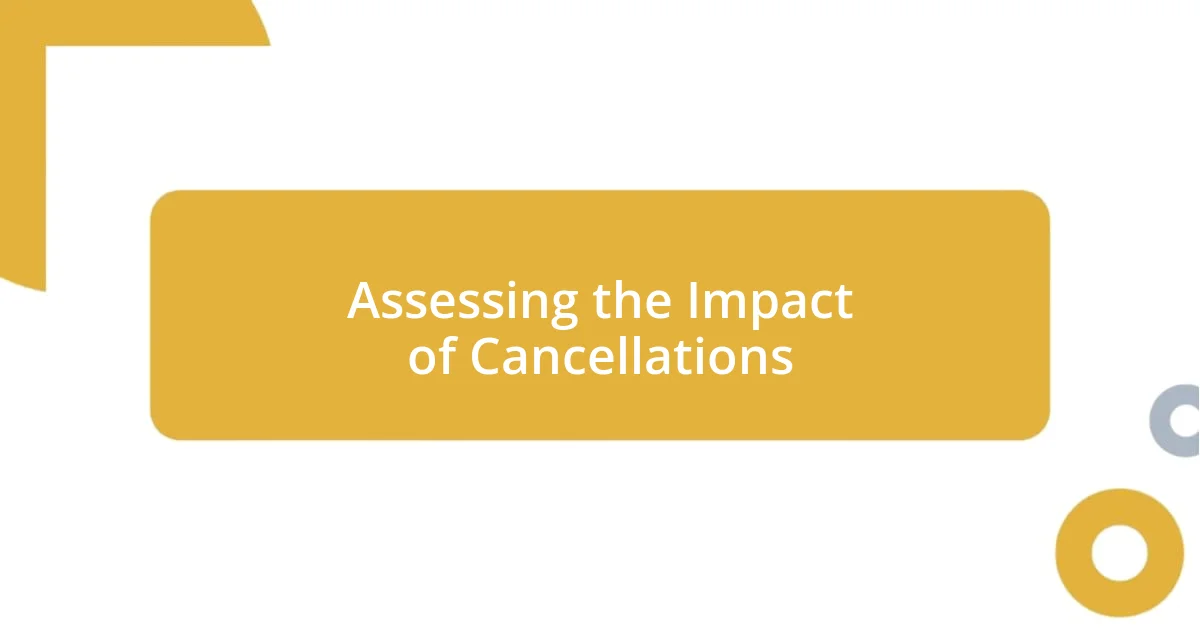
Assessing the Impact of Cancellations
Assessing the impact of cancellations extends beyond the immediate disappointment. I remember when a local arts festival was partially canceled due to unexpected weather conditions, and it really made me think about what was lost. Not only did attendees miss out on performances and workshops, but local artists and vendors felt the financial sting as well. It highlighted how intertwined our experiences can be and how a single event holds layers of significance for many people.
- Emotional Response: Grief over missed opportunities and shared experiences.
- Financial Impact: Artists and small businesses often rely on such events for income.
- Community Effects: A sense of unity is disrupted when shared plans fall through.
I learned that every cancellation affects various stakeholders differently. For example, when one exhibition was postponed, I felt a mix of relief and disappointment. On one hand, I was spared from the pressure of attending; on the other, I knew many local artists were counting on that exposure to grow their careers. Evaluating these layers really brought home the point that every cancellation carries weight, influencing not only logistics but also personal lives and community dynamics.
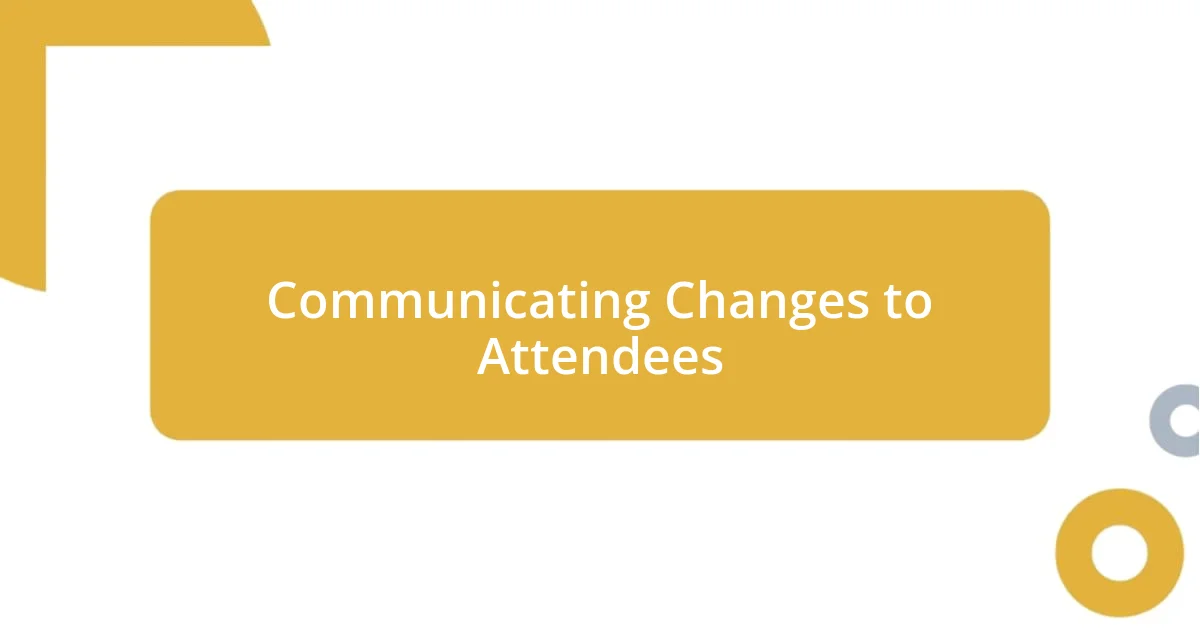
Communicating Changes to Attendees
Keeping attendees informed during a cancellation is crucial. I remember when I faced a last-minute schedule change at a conference I was attending. The organizers sent out an email that was clear and concise, listing the new agenda and updates in real-time. This transparent communication helped ease my anxiety about missing out on key discussions. Have you ever received a notification that actually made you feel part of the process despite the unfortunate circumstances? It truly can transform the experience.
Additionally, using multiple channels to communicate changes can tap into different preferences among attendees. When another event I was involved in had to shift its location, we utilized social media, emails, and even text messages to keep everyone in the loop. This approach not only helped ensure that everyone received the news but also made them feel valued and respected. Isn’t it amazing how a small investment in communication can have a significant impact on the overall atmosphere of the event?
Lastly, it’s important to acknowledge attendees’ feelings when conveying changes. During that same conference, the organizers took a moment to express their understanding of how disappointing it can be to have plans altered. They encouraged feedback and shared empathy. In my experience, this approach creates a sense of community and connection. How often do we overlook the human element during logistical changes? A few kind words can make all the difference in helping attendees feel supported.
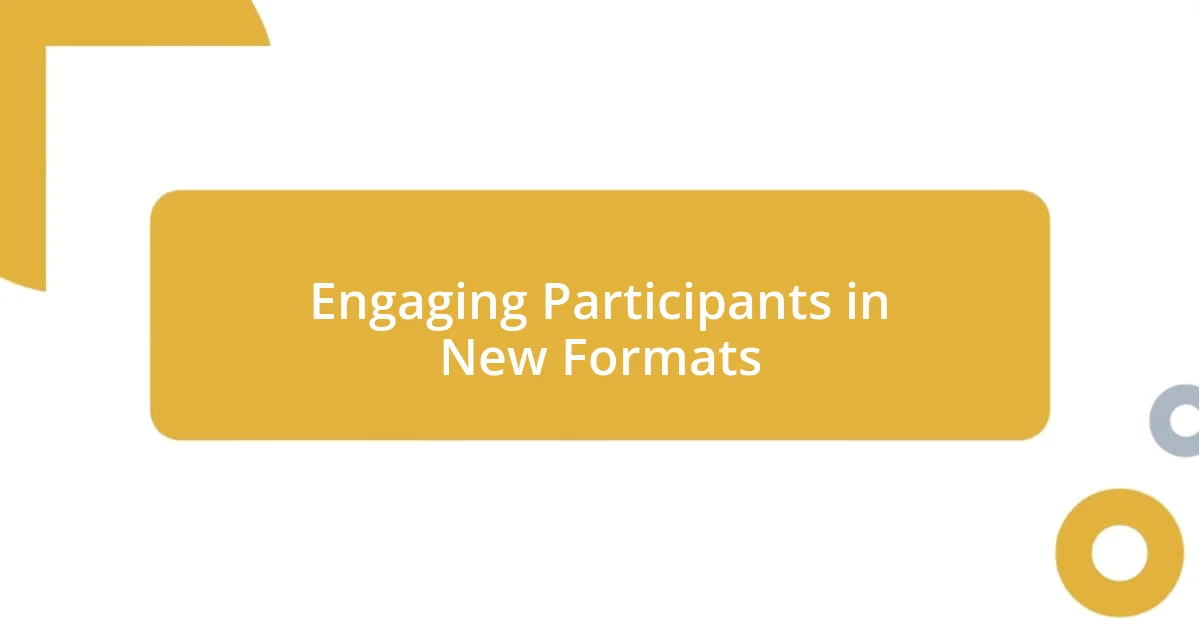
Engaging Participants in New Formats
When adapting to new formats, creativity is key. I once participated in a workshop that transitioned from an in-person gathering to a virtual format almost overnight. Initially, I was skeptical, wondering how an online space could replicate the energy of face-to-face interactions. However, the organizers surprised me by incorporating breakout rooms for small group discussions, which fostered a sense of intimacy that I hadn’t expected. Doesn’t it feel refreshing when an organizer thinks outside the box to enhance our experience?
Engagement strategies need to evolve alongside event formats. During a partially canceled community event, I witnessed how live polls and audience Q&As energized the virtual space in ways I hadn’t considered. Participants who typically remained silent during in-person events felt empowered to share their opinions online. It made me ponder, have you ever noticed how technology can amplify voices that might otherwise go unheard? This shift not only kept the audience engaged but also created a collective atmosphere that felt genuinely collaborative.
I’ve also learned that personal touches can bridge the gap caused by format changes. At another event, despite being virtual, the team sent personalized care packages to participants ahead of time. I felt a wave of gratitude when I opened mine to find a handwritten note alongside some themed goodies. It made the digital experience feel less distant and more like a shared occasion. Isn’t it fascinating how small gestures can transform our perspective and foster connections—even through screens?
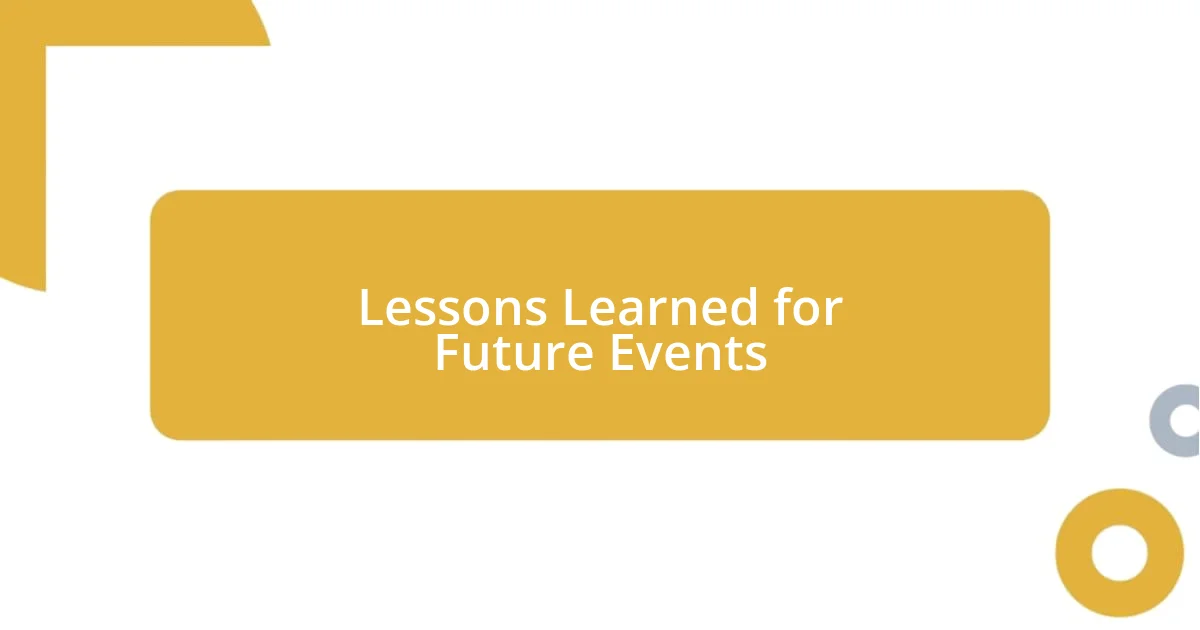
Lessons Learned for Future Events
Navigating a partially canceled event taught me valuable lessons about flexibility and planning. When one of my favorite guest speakers canceled last minute, I realized the importance of having backup options readily available. Since then, I’ve always kept a list of potential replacements for key speakers or entertainment, ensuring the show can go on smoothly. Have you ever faced a similar situation where being adaptable saved the day?
Another takeaway is the significance of gathering feedback post-event. I was surprised by how much insight I gained when attendees were invited to share their thoughts after an event I hosted. Their suggestions helped identify what went well and what could be improved. This ongoing dialogue not only enhances future events but also shows participants their opinions matter. Isn’t it enlightening how feedback can shape our approach and strengthen our connection with the audience?
Lastly, establishing a strong support network among team members is essential during uncertain times. I’ll never forget the camaraderie developed among my colleagues when we faced unexpected changes together. We ensured everyone was on the same page, which ultimately fostered a sense of teamwork and resilience. How do you think collaboration can help mitigate the stress of hosting events? In my view, a united front is an incredible asset when navigating the unpredictable landscape of event management.
